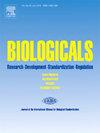An alternative In vitro method for evaluation of inactivated infectious bronchitis (IB) vaccines
IF 1.5
4区 生物学
Q4 BIOCHEMICAL RESEARCH METHODS
引用次数: 0
Abstract
We report a rapid in vitro method for the potency evaluation of oil-based inactivated Infectious Bronchitis virus (IBV) vaccines. The method is designed to be used by both, quality control laboratories during vaccine manufacturing and by authorizing national laboratories. The simple technique reduces the time and the number of live birds needed for vaccine potency evaluation, effectively promoting a clean environment. Further, the method is a convenient alternative to using the traditional vaccine potency test in which live animals are used. To illustrate a proof of concept, antigens from a total of ten commercial oil adjuvant infectious bronchitis vaccines from different manufacturers were chemically extracted using isopropyl myristate and an antigen capture ELISA test was used to quantify the antigen concentration in the aqueous extracts. The results from the conventional live birds’ tests, which determine the antibody titers after 3–4 weeks postvaccination, were compared to their corresponding antigen concentrations obtained by capture ELISA. The results indicate that, vaccines that contain a threshold amount of the specific IBV antigen (here determined to be > 1.26 pg/dose based on an antigen capture ELISA method), can be considered potent without the need to further test in live animals, provided that the concentration of the antigen can be reliably measured in its aqueous phase extract. Moreover, a linear relation between the antigen amount per dose and the antibody titer was found. Overall, the developed methods in this study are suited for high throughput vaccine potency evaluation.
评估灭活传染性支气管炎(IB)疫苗的另一种体外方法
我们报道了一种快速体外评价油基传染性支气管炎病毒(IBV)灭活疫苗效力的方法。该方法设计用于疫苗生产过程中的质量控制实验室和授权的国家实验室。这项简单的技术减少了评估疫苗效力所需的时间和活禽的数量,有效地促进了清洁的环境。此外,该方法是使用活体动物的传统疫苗效力试验的方便替代方法。为了说明概念证明,使用肉豆蔻酸异丙酯化学提取来自不同制造商的共10种商业油佐剂传染性支气管炎疫苗的抗原,并使用抗原捕获ELISA试验来量化水提取物中的抗原浓度。常规活禽试验测定疫苗接种后3-4周的抗体滴度,并将其结果与捕获ELISA获得的相应抗原浓度进行比较。结果表明,含有特定IBV抗原阈值的疫苗(这里确定为>;1.26 pg/剂量(基于抗原捕获ELISA方法),如果抗原的浓度可以在其水相萃取物中可靠地测量,则可以认为是有效的,无需在活体动物中进一步测试。此外,每剂量抗原量与抗体滴度之间存在线性关系。总的来说,本研究开发的方法适合于高通量疫苗效力评估。
本文章由计算机程序翻译,如有差异,请以英文原文为准。
求助全文
约1分钟内获得全文
求助全文
来源期刊

Biologicals
生物-生化研究方法
CiteScore
3.70
自引率
0.00%
发文量
39
审稿时长
48 days
期刊介绍:
Biologicals provides a modern and multidisciplinary international forum for news, debate, and original research on all aspects of biologicals used in human and veterinary medicine. The journal publishes original papers, reviews, and letters relevant to the development, production, quality control, and standardization of biological derived from both novel and established biotechnologies. Special issues are produced to reflect topics of particular international interest and concern.Three types of papers are welcome: original research reports, short papers, and review articles. The journal will also publish comments and letters to the editor, book reviews, meeting reports and information on regulatory issues.
 求助内容:
求助内容: 应助结果提醒方式:
应助结果提醒方式:


